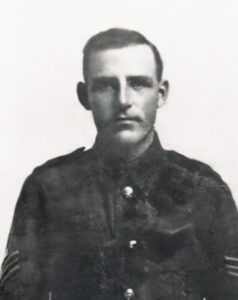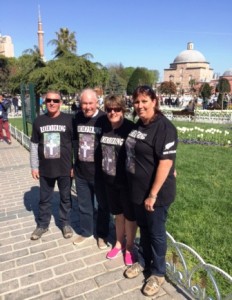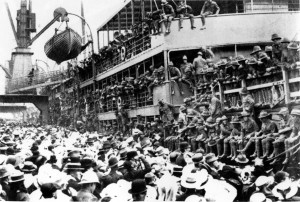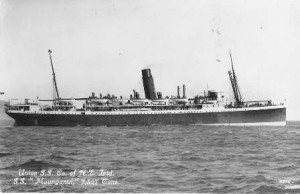Dear Grandad,
It is now 100 years on from your enlistment with 1NZEF (Reg. No. 15/92) and your service on all major Fronts of the Great War in which New Zealand participated. You were one of the first ANZACs. Sadly we were never to meet. I came into this World on 2 October 1938, 16 years and 3 months after your passing at Wellington Hospital on 8 July 1922, of Pneumonia, with your Service Records showing “Death due to war service”. Sadly virtually the only records we have of your life are those contained in your Service Records. I have used this as base information to try and build a picture of your life. Unfortunately there is no oral history to work with as my Dad, Jack, was only 8 years of age when you passed on, and later we were too young to think to question Grandma about you. Some information has been found in old newspapers, so with a bit of speculation I have been able to build a reasonable picture of your life and times.
Today, Thursday 16 April 2015, I have commenced along with 2,000 or more Kiwis, a pilgrimage to Gallipoli, Turkey to commemorate the Centenary of the ANZAC landings on the Gallipoli Peninsula. This will allow us a greater appreciation of your experiences as a soldier in World War 1.
I have accompanying me, from left in the photograph below: Son David, and on my left Daughter Robyn and David’s partner Pauline.

But first a little about your earlier years, You were born at Upper Brook, King’s Somborne, Hampshire, England on 7 November 1887, the fourth son of Harry Vine and Annie Hannah Crumpler, whose family comprised 12 children, 5 sons and 7 daughters. Your father’s occupation was given as “Thatcher” when your birth was registered by your mother at Stockbridge in the County of Southampton on 15 November 1887.
The 1901 Census records you as “John”, aged 13, occupation “Telegraph Messenger”.
In the 1911 Census you are recorded as a Servant at Weddington Hall, Nuneaton, Warwickshire, in the household of Henry Cunliffe Shawe with occupation given as “Groom”. Also, of significance to our story is that a son, Charles, Rifle Brigade Captain was resident at Weddington Hall.
You would be interested to know that you are still remembered at Weddington Hall. You are listed among the Victorian Servants of Weddington Castle on its website – I shall not attempt to explain what a “website” is, but all readers of this blog will know.
Shipping Records show: 13 November 1912: “Capt. C Shawe” and “Mr J Vine” departing Southampton, bound for New York, on the White Star Line Vessel Oceanic, with New Zealand shown as their destination. Both share Contract Ticket Number 119314.
The Evening Post, 17 December 1912 in the Late Shipping column reports the arrival that day of the RMS Makura in Auckland from Vancouver, British Columbia, Canada with a Mr Vine and Captain Shaw (sic) as passengers.
At the time of your enlistment with 1NZEF you were employed by Captain Shawe at Government House Wellington with Occupation shown as “Chauffeur and Manservant”. Captain Shawe was Military Secretary to the Governor, Arthur William de Brito Savile Foljambe, the 2nd Earl of Liverpool who was in 1917 to become New Zealand’s first Governor-General.
To obtain an understanding of your employment situation I have studied the meaning of “Batman” as this was obviously your position with Captain Shawe. I found that a Batman’s duties included the following:
“acting as a “runner” to convey orders from the officer to subordinates; maintaining the officer’s uniform and personal equipment as a valet; driving the officer’s vehicle, sometimes under combat conditions; other miscellaneous tasks the officer does not have time or inclination to do. In armies where officers typically came from the upper class, it was not unusual for a former batman to follow the officer into civilian life as a domestic servant.”
In your case the comment that it was not unusual for a batman to follow an officer into civilian life was reversed. Your position as a Groom at Weddington Hall and association with Charles Shawe led to your move from civilian life into the army.
Your Service Record shows you marched into Trentham Camp in Upper Hutt on the day of your enlistment, 15 August 1914 with 1 New Zealand Expeditionary Force
My daughter Robyn, by coincidence, manages the Pub (not there in your day) just around the corner from Trentham Camp, across on the other side of the Racecourse which became a Military Hospital during the War. Yes, the Camp still exists and today is a New Zealand Defence Force facility accommodating all three services and Joint NZDF facilities. Robyn’s daughter Rebecca and her family, at one time resided in Camp Road, in a former Army residence. My wife Judy worked in the Camp with the NZ Defence Force for 30 years and I resided in one of the old Barrack Blocks for a couple of years on coming down from the Waikato to work with the New Zealand Post Office. The Camp holds many memories for our family.
Our means of travel to Gallipoli, by air, is quite different from that used to get you from Wellington, New Zealand to Alexandria in Egypt. You will have seen aeroplanes on the Western Front. Our plane accommodates upwards of 400 passengers and the time for the trip to Istanbul (“Constantinople” in your day) is around 21 hours. The aeroplanes you will have seen on the Western Front were possibly Sopwith Camels, 5,000 of which were designed and manufactured by a company owned by your near neighbour, Sir Thomas Sopwith, at your birthplace, Upper Brook, King’s Somborne, Hampshire.
In comparison your transport, N.Z.T. No. 3, “Maunganui” with Headquarters Staff, N.Z.E.F. and other units (38 Officers, 528 Men and 204 Horses) which departed 16 October 1914 from Wellington and disembarked at Alexandria, Egypt, 3 December, took a total of 48 days. after stopovers in Hobart, Albany in Western Australia, where you were joined by a convoy of 28 Australian troopships; and Colombo. You had originally embarked on 24 September but departure had been delayed for three weeks until a ‘more powerful naval escort’ arrived in the form of the armoured cruiser HMS Minotaur and the Japanese battlecruiser IJN Ibuki.
 When the Main Body set sail it was bound for Europe to fight the Germans. However, at sea it was redirected to Egypt. Now, the initial role was to help protect the Suez Canal against attack by the forces of the Ottoman (Turkish) Empire, which had entered the war while your convoy was on the high seas. This makes very interesting reading when speculating as to your reason for enlisting in Wellington, as an Englishman, with the New Zealand Forces. It could be, safely I think, assumed that your objective was to meet up with Grandmother, Winifrede Edwards, a Scullery Maid at Government House, who had fallen pregnant and returned to England (in disgrace perhaps ?) in February 1914 for the birth of your first child, my father, William John Vine, at Shoreham by Sea, 29 July 1914. Note that this event took place just 17 days prior to your Enlistment.
When the Main Body set sail it was bound for Europe to fight the Germans. However, at sea it was redirected to Egypt. Now, the initial role was to help protect the Suez Canal against attack by the forces of the Ottoman (Turkish) Empire, which had entered the war while your convoy was on the high seas. This makes very interesting reading when speculating as to your reason for enlisting in Wellington, as an Englishman, with the New Zealand Forces. It could be, safely I think, assumed that your objective was to meet up with Grandmother, Winifrede Edwards, a Scullery Maid at Government House, who had fallen pregnant and returned to England (in disgrace perhaps ?) in February 1914 for the birth of your first child, my father, William John Vine, at Shoreham by Sea, 29 July 1914. Note that this event took place just 17 days prior to your Enlistment.
The decision to enlist and return to the Mother Country could very well have been discussed with your employer, Captain Charles Shawe, who was engaged as Military Secretary at Government House and would have had a very close knowledge of the scene.
I have carefully studied the 100th Anniversary Edition of Maurice Shadbolt’s “Voices of Gallipoli” (ISBN 978-1-877378-97-3) for ideas as to what may have motivated your enlistment with 1N.Z.E.F. This wonderful little publication contains interviews with 12 Gallipoli survivors and the question was asked as to what motivated these men to enlist. Responses ranged through “I was looking for adventure”, an orphaned man who saw it as a good chance to make a break and get out in the world, ” I felt it as a duty, I was patriotic, with a great pride in the British Empire, a mix of patriotism and adventure”, “I knew all my mates were going so I did too”, “I was as keen as mustard and belonged to the territorials and we all had a bit of the wild colonial spirit”, “it was the correct and proper thing to do”, “we were very much for the British Empire”, “I volunteered immediately because I knew all my mates would” and “it was more high adventure than anything else. Mind you I felt patriotic about the British Empire too”.
When considering your isolation, because of your employment at Government House, from general main stream New Zealanders, together with your British Citizenship, one can see that patriotism and the call to duty would have played a big part in your decision. However when one learns that within 2 weeks of your arrival back in England, 12 September 1915, you married Winifrede at West Dean near Chichester, it becomes clear that marriage could very well have been a major consideration in making your decision.
In the matter of your marriage and the circumstances under which Grandmother found herself back in England, it is interesting to note that she found support with your family, her strict Roman Catholic mother having declared that “no daughter of mine who finds herself pregnant outside of marriage shall cross my doorstep ever again”. There does not appear to have been any reconciliation with her parents. However, Grandmother returned to England briefly in the early 1960s and caught up with Sister Rose and also maintained contact with Mildred who had married William Brinley Murray and migrated to Perth, Western Australia. Mildred and Bill Murray honoured us here in New Zealand with a visit on the way back to the UK to have a painting, purported to be a “Rubens”, evaluated. I also have met with their daughter Pat in Perth on a couple of occasions.
Another of my family research finds was the son, Francis Victor Peter Edwards, of Grandma’s brother, Sidney George who had migrated to Bulawayo, Matabeleland North, Zimbabwe. I was lucky enough to meet my cousin Francis in Canterbury, Kent when in England in 2013.
Another brother Ernest seems to have lost himself in Australia. Mildred’s daughter Pat told me that the last they had heard of him was a Police enquiry as to his whereabouts, thought to be somewhere in the Eastern States of Australia.
The entry in your Service Records in relation to your withdrawal from Gallipoli reads: “15 August 1915 – Field Return – Sick to Hospital Ship – Dardenelles” 19 August 1915 – Ships Roll – Embarked for Malta per HS Ascania -19-8-15 Dysentery”, followed by: “5 September 1915 – “C/- ‘A’ Section – Embarked for England per “Plassy‟ – Jaundice” 12 September 1915 – “War Office – Admitted to Military Hospital New End, Hampstead”.
This entry makes interesting reading, It would appear that the greater number of those evacuated went to Lemnos or Alexandria. Perhaps Grand Dad your English citizenship resulted in hospitalisation in England, contrary to the usual practice with Kiwis going to Lemnos or Alexandria.
It gives us a laugh in this more enlightened age when we find that Dad has two birth dates in your Service Records – 29 July 1914, the correct date, and 29 July 1916, following your marriage. Of course this has come to light only recently with my research. Unfortunately my mother has passed away and I was not able to apprise her of this fact. I would have given quids to have seen the look on her face.
In an endeavour to ascertain something about your activities while at Gallipoli (25 April – 15 August 1915) I went back to Shadbolt’s publication (page 38). The only HQ staff person included among those interviewed was one Russell John Weir who “began on Gallipoli with New Zealand Infantry Brigade headquarters’s staff …” Coincidently Russell carried the next consecutive Number to yours – his was 15/93. He had enlisted in Wellington on 26 August 1914. Did you know him? All I could find that might throw some light on the subject was the following from the interview: “it became clear to headquarters staff that the quicker we could dig in , and get out heads underground the better. So much for the quick fight we thought we might be missing. That was to be our lot at Anzac for months to come. Dug in with heads underground, and heaven help anyone who wasn’t. The shrapnel was deadly…..”
Russell tells that one of the few times they weren’t underground was when they were shipped down to Cape Helles to help out the British regular attack which had foundered at that end of the Peninsula.
Your departure from Gallipoli occurred immediately after the battle for Chunuk Bair.
You were discharged to furlough 22 September 1915, completed furlough 6 October and returned to active service 1 March 1916.
Your posting, dated 14 March was “with Lt Col Gardner” and you were “Taken on strength Moascar 14 March 1916”.
Colonel Gardner’s service records contain a note: “This soldier belonged to the RNZA. At the time war broke out he was going through a course of instruction at the Staff College at Camberley (Surrey, England). For some months he was deployed on Coast Defence work but was finally transferred to the NZFA and sent to Egypt and is now in France.
Your transfer from Headquarters to Divisional Artillery was a defining moment in your war service. More about that later.
This is a relevant place at which to conclude this Blog as your deployment to the Field Artillery and deployment to join 5 Battery on the Western Front in Europe was a defining point in your military history. My next writings will cover our experiences in Turkey over the next 12 days or so, to be followed by something of the second part of your service with the New Zealand Field Artillery.
Grandma was extremely proud of your service with the Military and had a particular liking for Gunners. Your second son, Thomas Alfred Noel, served in the Artillery in the Second World War (1939 – 45) and went on to make a career in the Army. Uncle Noel, or “Tan”, as he was commonly known, served in K Force in Korea (1964 – 66) and was Mentioned in Despatches. He was the first RSM with K Force and retired with the rank of Major.
Your youngest son Geoffrey William (known as Bill) also served in WW2 in North Africa and Italy. Uncle Bill took up farming on his return to New Zealand. He never married.
Rest in Peace Grandad.
